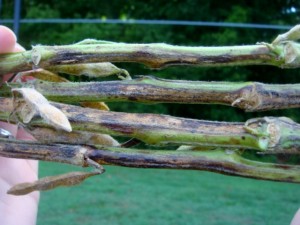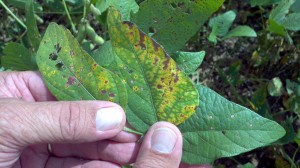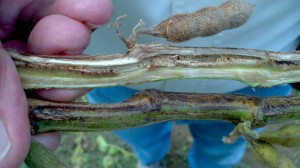Stem canker is now causing severe damage and death in some susceptible soybean varieties at the Milan REC and at two field research locations near Dyersburg, TN. This is the most stem canker we have noted in several years.

Stem canker can be seen as just a dead plant here and there or in very susceptible varieties almost every plant can be killed. This year in many cases, where light or sandy soil exists, charcoal rot root may be the cause of early death. This is because some of the symptoms of charcoal rot may be confused with those of stem canker. Both diseases show symptoms of dead leaves remaining attached late in the season.
First symptoms of stem canker appear as small reddish brown spots on stems near a lower node. These spots develop into cankers that can be several inches long running up the stem from the point of infection but only on one side (Picture 1 & 2). As the plant dies and the stem turns brown, the cankers are difficult to distinguish from the rest of the stem tissue.
Leaf symptoms first appear as yellowing between the veins being more apparent on one side of the affected leaves (Picture 3). These leaves later turn brown and die but remain stuck to the stem. Affected dry plants can easily break over when pushed. The pith of the stems will turn a light brown instead of remaining white and healthy (Picture 4). In some cases, the Dectes stem borer may have caused a dark- brown pith, but usually does little damage. Seed from diseased plants will be reduced in size and number reducing yield, depending on the disease severity. Planting infected seed the following year can increase the severity of stem canker and can be carried to other fields. Infected crop debris can cause disease up to 18 months, so a two year rotation is necessary to rid fields of stem canker.
Stem canker resistant varieties should always be planted especially in fields that have had a history of stem canker. However, producers should take care and plant varieties that not only have stem canker resistance, but look to include resistance to other diseases such as frogeye leaf spot and Sudden Death Syndrome (SDS). A complete list of resistant varieties planted at the disease nursery at the MREC will be published as soon as they are rated for disease.




